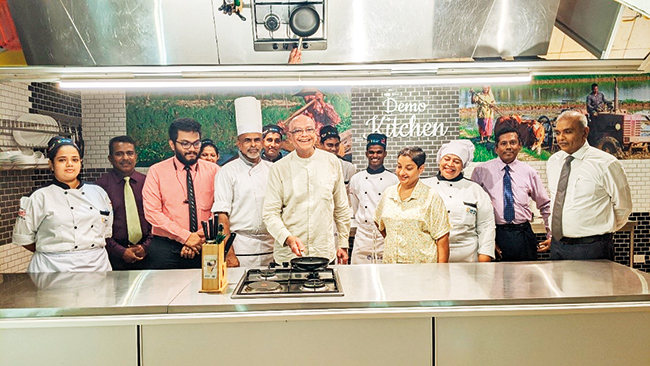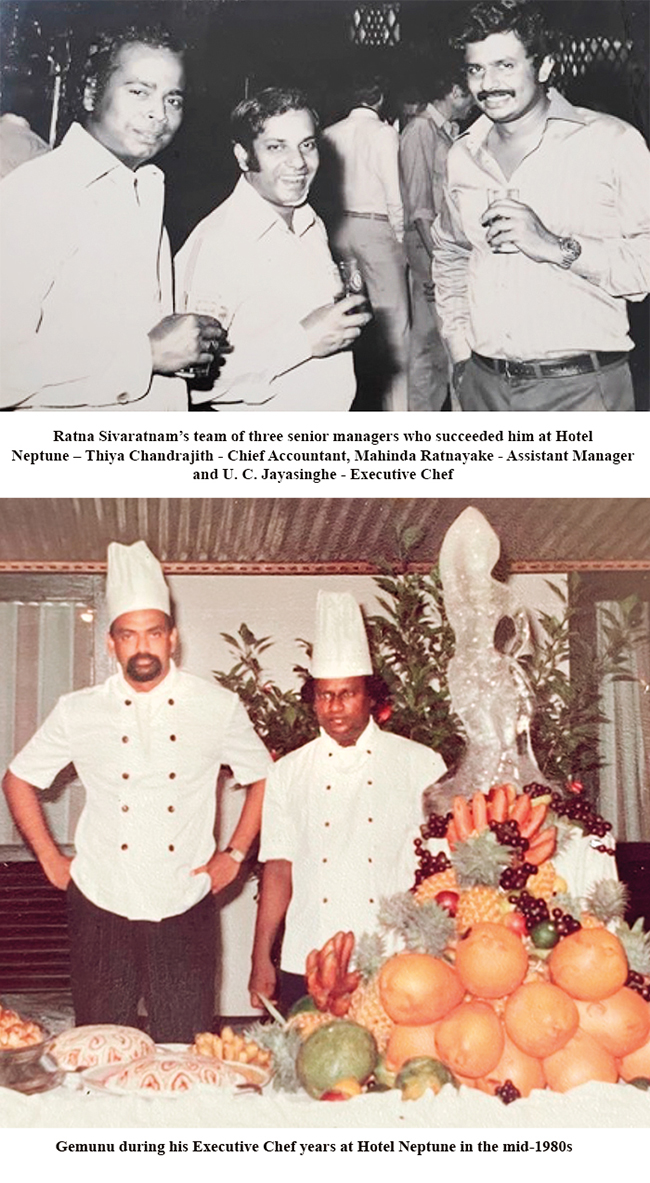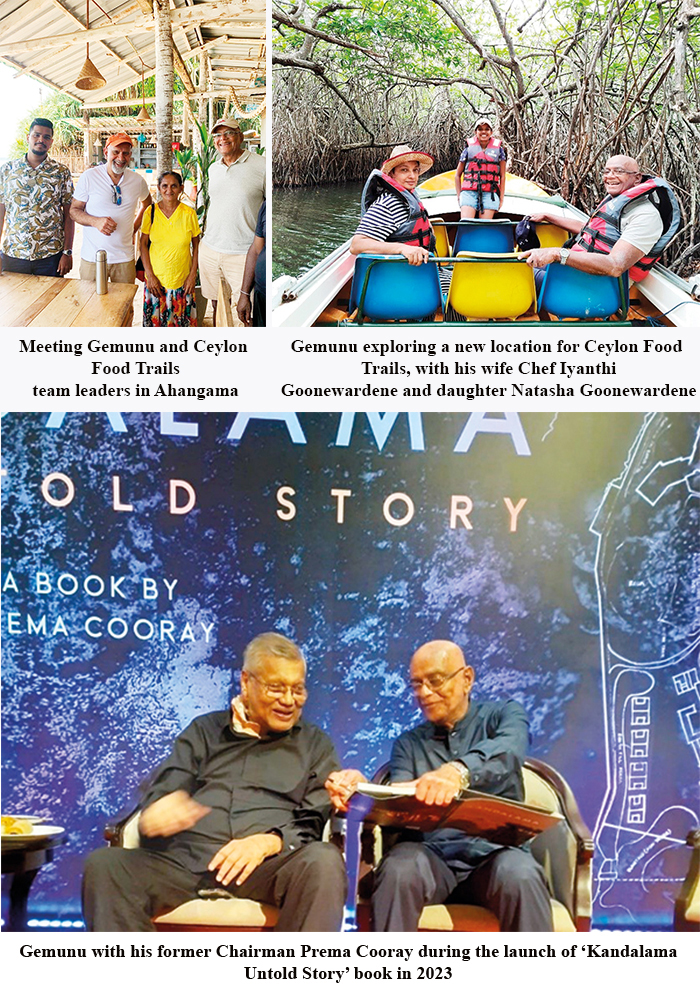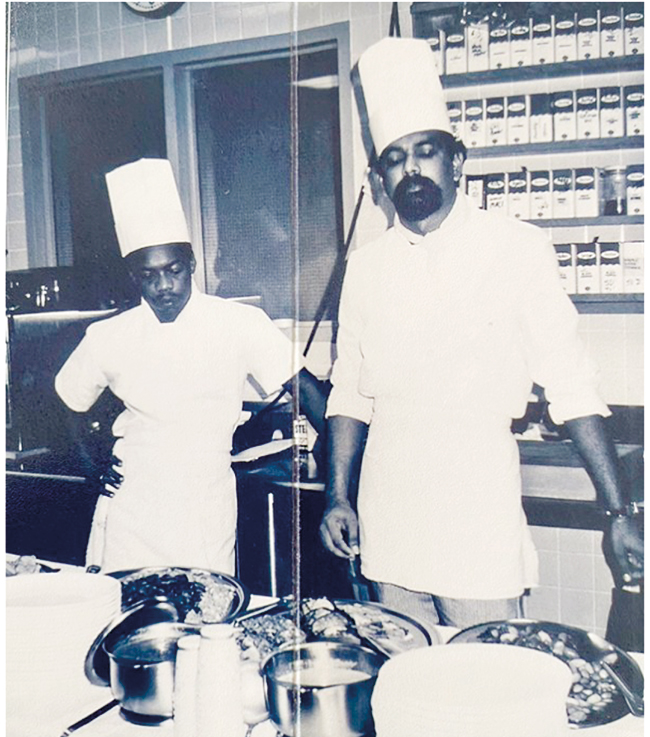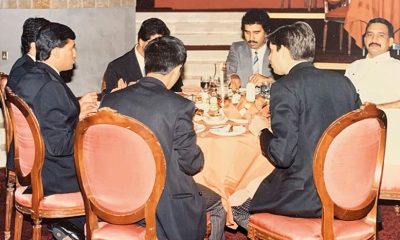Features
Gemunu Goonewardena Chef, Hotelier & Tourism Entrepreneur

PLACES, PEOPLE & PASSIONS (3Ps)
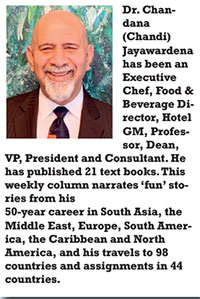 Dr. Chandana (Chandi) Jayawardena DPhil
Dr. Chandana (Chandi) Jayawardena DPhil
President – Chandi J. Associates Inc. Consulting, Canada
chandij@sympatico.ca
Profile
Gemunu commenced his hotel career in 1975 peeling onions, as a Kitchen Trainee at Hotel Neptune. He then continued with the same company for 43 years, slowly and steadily climbing steps, as Assistant Chef in 1978, Executive Chef in 1983, Corporate head of Food & Beverage in 1991, Director in 1998 and Vice President in 2010. In between, he gained experience as a Chef in Australia, and trained in USA. After his retirement from the company in 2018, he was appointed as a Non-Executive Director of Aitken Spence Hotel Holding PLC. Today, he is the Chairman of Win-Stone Group, Deputy Chairman of Marino Leisure Holdings, and until recently he served as the Chairman of the Tourist Hotels Classification Committee.
My first meeting with Gemunu
Just before Christmas in 1974, when Aitken Spence opened Hotel Neptune, it became the main “friendly” competitor for Bentota Beach Hotel, which was the best resort hotel in Sri Lanka at that time. Hotel Neptune recruited U. C. Jayasinghe (UC) the Assistant Chef of Bentota Beach, as their first Executive Chef. That change, for my luck, created an opening for me to join Bentota Beach hotel as the Trainee Executive Chef. One of my batchmates from Ceylon Hotel School (CHS), Patrick Taylor joined Neptune as the Assistant Chef. We were all good friends and frequently met after dinner service for a chat, a drink and fun.
One day in 1975, UC introduced Gemunu Goonewardena to me when I visited the Neptune kitchen. “Chandana, meet Gemunu, our new Kitchen Trainee. I am teaching him the ropes the hard way”, UC told me with a cheeky grin. Having worked under UC at Bentota Beach Hotel during my CHS internship in 1973, I knew that he was a tough boss. I felt sorry for Gemunu when UC pushed him aggressively, to learn the trade. Gemunu is one year younger to me, and I identified him as a late developer, just like me. We became friends.
Although Gemunu was occasionally upset with UC, he was determined to master culinary arts. Forty-eight years later I am convinced, that tough training he received in the mid 1970s, built Gemunu’s character and laid a strong foundation for one of the greatest careers in the hotel industry of Sri Lanka, that commence peeling onions and ended with creating innovative visions at boardrooms for decades. I am immensely proud of Gemunu and very happy to call him my friend.
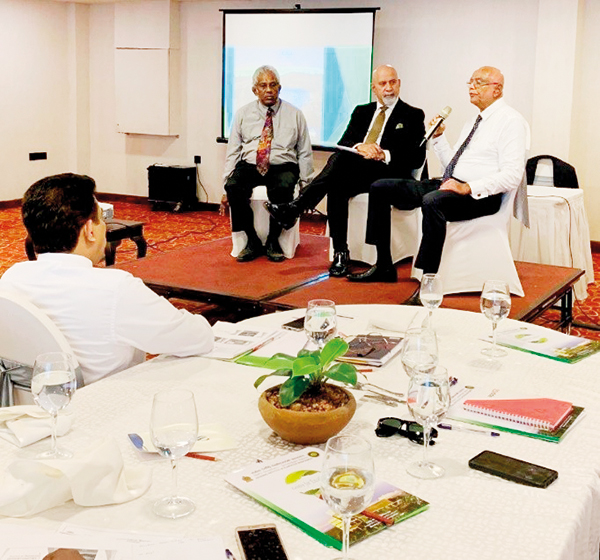
Gemunu joined me as a panellist at a National Institute of Plantation Management (NIPM seminar I conducted for 25 senior plantation managers in 2023
Friend, Student and Partner
In 1981, when I left a senior management position at John Keells corporate office to join CHS as a Senior Lecturer, Gemunu had spent five years studying there while working at Hotel Neptune. Soon after that Gemunu graduated from CHS. In 1991, when I ran a series of management seminars as the Managing Director of the International Hotel School of Mount Lavinia Hotel. Gemunu was a regular at seminars. I then realized that he is a lifelong learner, and hungry for all types of knowledge. Our close friendship continued until I left Sri Lanka in 1994 to pursue my global career.
After that from a distance, I occasionally heard the progress Gemunu was making in Sri Lanka. Gemunu is renowned for his innovative approach to gastronomy. He spearheaded the ‘Heritance Cuisine’ that combines local ingredients, traditional techniques, and international influences. His latest endeavor, ‘Ceylon Food Trails’, offers an immersive experience into Sri Lankan culture and authentic indigenous food in remote villages.
In 2021, when I commenced my autobiographical Sunday Island newspaper column: ‘Confessions of a Global Gypsy’, Gemunu commenced calling me in Canada every Sunday after he read the latest episode of the series. Our Sunday discussions became longer every week, with the series motivating Gemunu to ask me various questions. Gemunu loved engaging in meaningful conversations. “Gemunu, please don’t call me before 11:00 am, because I watch my favourite weekly TV program – The Global Public Square (GPS) with Fareed Zakaria, at that time.” I gently pushed Gemunu’s weekly calls on Sundays to after 9:30 pm Sri Lanka time.
When Gemunu invited me to do some assignments for the International Tourism Volunteers Association (ITVA), I asked him, “What is ITVA?” he explained, “that it is a loosely formed association – more like a consortium of hospitality and tourism professionals to connect and pursue common activities or causes in a more relaxed environment.” Gemunu is a good salesman, and I was convinced to give my time free, to speak, lead and moderate a few webinars. Global Hospitality Forum, which I lead, collaborated with ITVA, in those initiatives.
Gemunu Taking Charge of my Schedule
When I casually informed Gemunu that I will spend seven weeks in Sri Lanka from mid-March 2023, Gemunu formally took charge of my itinerary. My intention of spending a relaxed holiday with the family had to be changed. Gemunu filled my schedule with various re-connection meetings with veteran hoteliers, excursions around the island with Gemunu, and a few innovative leadership seminars for various hotel management teams.
A highlight of my seven-week visit to Sri Lanka in 2023, was gaining first-hand ‘Ceylon Food Trails’ experiences in Ahangama and Ingiriya. It was refreshing getting to know of Gemunu’s passion on sustainable development of community tourism to showcase authentic cuisine of Sri Lanka.
Gemunu’s team simply facilitate and promote the concept, but it is the leaders from the village communities who run each operation and village service providers who benefit from each operation. Gemunu is keen that 70% of the income from Ceylon Food Trails operations remain within the villages. “We currently have 12 operations in different parts of the country. Our aim is to eventually help 100 villages”, Gemunu shared his optimism with me. “Let’s do a colourful book with all these authentic village recipes, when you reach 52 – one per week”, I planted a seed in his mind.
As exploring human behaviour is a new hobby of Gemunu, I was invited to do a seminar on my concept of ‘Personality Analysis’ to his top leadership team of Win-Stone Group. Gemunu and his wife – Iyanthi who manages the Win-Stone Culinary School, honoured me by attending the whole seminar. After the seminar, I asked Gemunu 10 questions for this article.
Q: Out of all the places you have visited in Sri Lanka and overseas, what is your favorite and most interesting place?
A: I deeply appreciate and admire the rich tapestry of historical and contemporary architectural wonders found across various nations. Among them, one gem that truly captivates my heart is the ancient city of Anuradhapura, dating back to the 5th century BC. Anuradhapura’s unparalleled cultural and historical significance, coupled with its breathtaking aesthetic allure, makes it truly deserving of the utmost admiration and acclaim.
Q: Out of all the inspiring people you have met, who inspired you most?
A: Out of all the remarkable individuals I have had the privilege of meeting, Mr. Ratna Sivaratnam stands out as the most inspiring. I used to work under him from the start of my career. As a consummate professional and a true gentleman, he played an instrumental role in shaping Aitken Spence Hotels and Travels into the successful entity it is today and ended up as the Chairman of the company. Witnessing his leadership qualities firsthand, I found him to be an exceptional leader whom everyone enjoyed working with and working under.
Q: In addition to Mr. Ratna Sivaratnam, I am aware that you had a few outstanding mentors. Please explain how they helped you at different stages of your career?
A:Mr. Mahinda Ratnayake was my first mentor. He hired me fresh out of Nalanda College and instilled in me a sense of discipline and working in an organized manner. Under the guidance of Mr. U. C. Jayasinghe, the first Executive Chef of Hotel Neptune, I learned invaluable lessons that contributed to my growth as a successful chef. Upon my transfer to Palm Village from Neptune, Mr. Thiya Chandrajith, the Aitken Spence Group General Manager, became my mentor, empowering me to enhance my performance. Then Mr. Prema Cooray, with whom I closely collaborated during the Kandalama Hotel Project and Aitken Spence Hotels in the Maldives. He supported me in my innovative and unconventional approaches when facing challenges.
Lastly, Managing Director Mr. Malin Hapugoda when the company opened and managed Waters Edge, and then took over hotel projects in India and Oman. I learnt from him high level conceptual skills. He tolerated some of my idiosyncrasies and balanced it out which helped the company immensely to become the largest Sri Lankan hotel company operating in four countries.
Q: At the present time, what is your key passion in life, other than gastronomy, hospitality, and tourism?
A: Currently, it revolves around exploring human behavior. I find great fascination in studying the intricacies of human interactions and motivations. As a student of geopolitics, I constantly seek to deepen my understanding of global affairs and their impact on societies as well. Furthermore, I derive immense pleasure from engaging in meaningful conversations and appreciating the company of diverse individuals. I firmly believe that each person carries a unique story and I thoroughly enjoy conversing with people who possess such rich experiences. It is through these interactions that I continually learn and gain valuable insights from others, broadening my perspective and enriching my personal growth.
Q: From your time studying and training in Sri Lanka, Australia and USA, which experience stands out as the most memorable?
A: The most memorable experience occurred at Neptune Hotel in Sri Lanka. It involved an incident where a staff member of our hotel had an altercation with the senior village headman, resulting in the entire village surrounding us in search of the attacker. However, the elders of the village intervened and pleaded for our safety, highlighting the values of unity, community, and solidarity. The tactical and diplomatic way Mr. Mahinda Ratnayake handled this incident taught us the importance of working together with the local community, fostering mutual benefit rather than division. Through effective communication, we resolved the situation without further escalation. From a professional culinary standpoint, I gained memorable experience as a mature student at the Culinary Institute of America, New York.
Q: During your early career, what was the most rewarding experience you had as a Chef?
A: One of the most gratifying experiences was when I was the Executive Chef and Food & Beverage Manager of Hotel Palm Village in 1983. I was entrusted with the task of organizing a grand gala dinner for a staggering 500 guests, which occurred every fortnight over a period of six months. At that time, the hotel was equipped to accommodate and cater to only 100 guests, making this challenge quite formidable. However, under the guidance and support of Mr. Chandrajith, I eagerly embraced the opportunity. The entire experience was a mix of vivid memories—rewarding, chaotic, and incredibly educational.
Q: How do you describe your key corporate contributions during the long period you served as a Director and a Member of the Board at Aitken Spence Hotel Holding PLC., and in building the ‘Heritance’ brand?
A: During my tenure at Aitken Spence Hotel Holdings PLC., I made significant corporate contributions by spearheading the development of several iconic properties. My primary focus was to seamlessly blend the architectural designs of these properties with their practical operational aspects, ensuring a harmonious balance between aesthetics and functionality. Additionally, I had the privilege of mentoring numerous associates who went on leading a successful career and reached the top of their field.
Regarding the ‘Heritance’ brand, I played a pivotal role in establishing the Minimum Quality Standards (MQS) Manual. I approached the branding of Heritance in a distinctive and novel manner, differentiating it from other prominent brands in Sri Lanka and the region. The name “Heritance” itself, derived from the fusion of “Heritage” and “Inheritance,” was chosen to embody the unique historical and cultural essence of each property and its surrounding environment. This approach gave the Heritance brand a distinct identity and outlook, capturing the essence of its individuality and deep-rooted connections to heritage.
Q: How do you describe your main contribution at a macro level, to the hotel industry in Sri Lanka when you served as the Chairman of the Tourist Hotels Classification Committee?
A: During my term as the Chairman, I led the introduction of qualitative aspects such as hotel branding to ensure certified quality and enhance the property and destination image. My main contribution at a macro level to the hotel industry in Sri Lanka was focused on promoting sustainable tourism. Our team introduced localized standards that encompassed all four aspects of conservation, community, culture, and commerce, with the aim of positively impacting the well-being of the planet and its people. One of the key criteria we implemented was encouraging hotel properties to actively address biodiversity conservation through sustainable solutions. This involved carefully selecting products in the food and beverage sector and working closely with communities and producers who embraced biodiversity conservation in their production cycles. Through these initiatives, our objective was to foster a sustainable and responsible approach to tourism, where the natural environment, wildlife, local communities, and cultural heritage were respected, conserved, and celebrated.
Q: Currently, you seem to have many irons in the fire, with Win-Stone Group, Tamarind Tree Hotel, Marino Beach Hotel, Ceylon Food Trails etc. What is your secret in managing time and developing the next generation of industry leaders?
A: First, I aim to create a conducive environment for people to perform, an environment that fosters optimal performance among individuals. To achieve this, I provide clear principles, values, and policies, and then empower them to take ownership of the project/work given to them. At the same time, if any mistakes or problem occur, I step forth and take the blame. My management approach revolves around inspiring my colleagues and associates to willingly engage in tasks by aligning their desires with the objectives I set forth. By creating a sense of intrinsic motivation, I encourage them to enthusiastically embrace their duties where they perform their best. Hence, my secret lies in a leadership approach centred on delegation and giving responsibility.
Q: In a context of “Sustainable Development”, what are the key lessons you learnt by leading the concept of ‘Heritance Cuisine’, that helped you to develop ‘Ceylon Food Trails’?
A: Leading the concept of ‘Heritance Cuisine’ taught me the significance of sustainable development in the culinary realm. By showcasing the fusion of local ingredients and international influences, I realized the value of highlighting the unique flavors and ingredients found within Sri Lanka. This experience inspired me to delve deeper into indigenous recipes and the traditional knowledge surrounding local food, including its health benefits. Consequently, this led to the development of ‘Ceylon Food Trails,’ where I aim to study and share the rich culinary heritage of Sri Lanka with the world, emphasizing sustainable practices and the cultural significance of gastronomy.
recipes and the traditional knowledge surrounding local food, including its health benefits. Consequently, this led to the development of ‘Ceylon Food Trails,’ where I aim to study and share the rich culinary heritage of Sri Lanka with the world, emphasizing sustainable practices and the cultural significance of gastronomy.
Next week, 3Ps will feature a historian and author who is also an adventurer and an award-winning filmmaker …
Features
The heart-friendly health minister

by Dr Gotabhya Ranasinghe
Senior Consultant Cardiologist
National Hospital Sri Lanka
When we sought a meeting with Hon Dr. Ramesh Pathirana, Minister of Health, he graciously cleared his busy schedule to accommodate us. Renowned for his attentive listening and deep understanding, Minister Pathirana is dedicated to advancing the health sector. His openness and transparency exemplify the qualities of an exemplary politician and minister.
Dr. Palitha Mahipala, the current Health Secretary, demonstrates both commendable enthusiasm and unwavering support. This combination of attributes makes him a highly compatible colleague for the esteemed Minister of Health.
Our discussion centered on a project that has been in the works for the past 30 years, one that no other minister had managed to advance.
Minister Pathirana, however, recognized the project’s significance and its potential to revolutionize care for heart patients.
The project involves the construction of a state-of-the-art facility at the premises of the National Hospital Colombo. The project’s location within the premises of the National Hospital underscores its importance and relevance to the healthcare infrastructure of the nation.
This facility will include a cardiology building and a tertiary care center, equipped with the latest technology to handle and treat all types of heart-related conditions and surgeries.
Securing funding was a major milestone for this initiative. Minister Pathirana successfully obtained approval for a $40 billion loan from the Asian Development Bank. With the funding in place, the foundation stone is scheduled to be laid in September this year, and construction will begin in January 2025.
This project guarantees a consistent and uninterrupted supply of stents and related medications for heart patients. As a result, patients will have timely access to essential medical supplies during their treatment and recovery. By securing these critical resources, the project aims to enhance patient outcomes, minimize treatment delays, and maintain the highest standards of cardiac care.
Upon its fruition, this monumental building will serve as a beacon of hope and healing, symbolizing the unwavering dedication to improving patient outcomes and fostering a healthier society.We anticipate a future marked by significant progress and positive outcomes in Sri Lanka’s cardiovascular treatment landscape within the foreseeable timeframe.
Features
A LOVING TRIBUTE TO JESUIT FR. ALOYSIUS PIERIS ON HIS 90th BIRTHDAY

by Fr. Emmanuel Fernando, OMI
Jesuit Fr. Aloysius Pieris (affectionately called Fr. Aloy) celebrated his 90th birthday on April 9, 2024 and I, as the editor of our Oblate Journal, THE MISSIONARY OBLATE had gone to press by that time. Immediately I decided to publish an article, appreciating the untiring selfless services he continues to offer for inter-Faith dialogue, the renewal of the Catholic Church, his concern for the poor and the suffering Sri Lankan masses and to me, the present writer.
It was in 1988, when I was appointed Director of the Oblate Scholastics at Ampitiya by the then Oblate Provincial Fr. Anselm Silva, that I came to know Fr. Aloy more closely. Knowing well his expertise in matters spiritual, theological, Indological and pastoral, and with the collaborative spirit of my companion-formators, our Oblate Scholastics were sent to Tulana, the Research and Encounter Centre, Kelaniya, of which he is the Founder-Director, for ‘exposure-programmes’ on matters spiritual, biblical, theological and pastoral. Some of these dimensions according to my view and that of my companion-formators, were not available at the National Seminary, Ampitiya.
Ever since that time, our Oblate formators/ accompaniers at the Oblate Scholasticate, Ampitiya , have continued to send our Oblate Scholastics to Tulana Centre for deepening their insights and convictions regarding matters needed to serve the people in today’s context. Fr. Aloy also had tried very enthusiastically with the Oblate team headed by Frs. Oswald Firth and Clement Waidyasekara to begin a Theologate, directed by the Religious Congregations in Sri Lanka, for the contextual formation/ accompaniment of their members. It should very well be a desired goal of the Leaders / Provincials of the Religious Congregations.
Besides being a formator/accompanier at the Oblate Scholasticate, I was entrusted also with the task of editing and publishing our Oblate journal, ‘The Missionary Oblate’. To maintain the quality of the journal I continue to depend on Fr. Aloy for his thought-provoking and stimulating articles on Biblical Spirituality, Biblical Theology and Ecclesiology. I am very grateful to him for his generous assistance. Of late, his writings on renewal of the Church, initiated by Pope St. John XX111 and continued by Pope Francis through the Synodal path, published in our Oblate journal, enable our readers to focus their attention also on the needed renewal in the Catholic Church in Sri Lanka. Fr. Aloy appreciated very much the Synodal path adopted by the Jesuit Pope Francis for the renewal of the Church, rooted very much on prayerful discernment. In my Religious and presbyteral life, Fr.Aloy continues to be my spiritual animator / guide and ongoing formator / acccompanier.
Fr. Aloysius Pieris, BA Hons (Lond), LPh (SHC, India), STL (PFT, Naples), PhD (SLU/VC), ThD (Tilburg), D.Ltt (KU), has been one of the eminent Asian theologians well recognized internationally and one who has lectured and held visiting chairs in many universities both in the West and in the East. Many members of Religious Congregations from Asian countries have benefited from his lectures and guidance in the East Asian Pastoral Institute (EAPI) in Manila, Philippines. He had been a Theologian consulted by the Federation of Asian Bishops’ Conferences for many years. During his professorship at the Gregorian University in Rome, he was called to be a member of a special group of advisers on other religions consulted by Pope Paul VI.
Fr. Aloy is the author of more than 30 books and well over 500 Research Papers. Some of his books and articles have been translated and published in several countries. Among those books, one can find the following: 1) The Genesis of an Asian Theology of Liberation (An Autobiographical Excursus on the Art of Theologising in Asia, 2) An Asian Theology of Liberation, 3) Providential Timeliness of Vatican 11 (a long-overdue halt to a scandalous millennium, 4) Give Vatican 11 a chance, 5) Leadership in the Church, 6) Relishing our faith in working for justice (Themes for study and discussion), 7) A Message meant mainly, not exclusively for Jesuits (Background information necessary for helping Francis renew the Church), 8) Lent in Lanka (Reflections and Resolutions, 9) Love meets wisdom (A Christian Experience of Buddhism, 10) Fire and Water 11) God’s Reign for God’s poor, 12) Our Unhiddden Agenda (How we Jesuits work, pray and form our men). He is also the Editor of two journals, Vagdevi, Journal of Religious Reflection and Dialogue, New Series.
Fr. Aloy has a BA in Pali and Sanskrit from the University of London and a Ph.D in Buddhist Philosophy from the University of Sri Lankan, Vidyodaya Campus. On Nov. 23, 2019, he was awarded the prestigious honorary Doctorate of Literature (D.Litt) by the Chancellor of the University of Kelaniya, the Most Venerable Welamitiyawe Dharmakirthi Sri Kusala Dhamma Thera.
Fr. Aloy continues to be a promoter of Gospel values and virtues. Justice as a constitutive dimension of love and social concern for the downtrodden masses are very much noted in his life and work. He had very much appreciated the commitment of the late Fr. Joseph (Joe) Fernando, the National Director of the Social and Economic Centre (SEDEC) for the poor.
In Sri Lanka, a few religious Congregations – the Good Shepherd Sisters, the Christian Brothers, the Marist Brothers and the Oblates – have invited him to animate their members especially during their Provincial Congresses, Chapters and International Conferences. The mainline Christian Churches also have sought his advice and followed his seminars. I, for one, regret very much, that the Sri Lankan authorities of the Catholic Church –today’s Hierarchy—- have not sought Fr.
Aloy’s expertise for the renewal of the Catholic Church in Sri Lanka and thus have not benefited from the immense store of wisdom and insight that he can offer to our local Church while the Sri Lankan bishops who governed the Catholic church in the immediate aftermath of the Second Vatican Council (Edmund Fernando OMI, Anthony de Saram, Leo Nanayakkara OSB, Frank Marcus Fernando, Paul Perera,) visited him and consulted him on many matters. Among the Tamil Bishops, Bishop Rayappu Joseph was keeping close contact with him and Bishop J. Deogupillai hosted him and his team visiting him after the horrible Black July massacre of Tamils.
Features
A fairy tale, success or debacle

Sri Lanka-Singapore Free Trade Agreement
By Gomi Senadhira
senadhiragomi@gmail.com
“You might tell fairy tales, but the progress of a country cannot be achieved through such narratives. A country cannot be developed by making false promises. The country moved backward because of the electoral promises made by political parties throughout time. We have witnessed that the ultimate result of this is the country becoming bankrupt. Unfortunately, many segments of the population have not come to realize this yet.” – President Ranil Wickremesinghe, 2024 Budget speech
Any Sri Lankan would agree with the above words of President Wickremesinghe on the false promises our politicians and officials make and the fairy tales they narrate which bankrupted this country. So, to understand this, let’s look at one such fairy tale with lots of false promises; Ranil Wickremesinghe’s greatest achievement in the area of international trade and investment promotion during the Yahapalana period, Sri Lanka-Singapore Free Trade Agreement (SLSFTA).
It is appropriate and timely to do it now as Finance Minister Wickremesinghe has just presented to parliament a bill on the National Policy on Economic Transformation which includes the establishment of an Office for International Trade and the Sri Lanka Institute of Economics and International Trade.
Was SLSFTA a “Cleverly negotiated Free Trade Agreement” as stated by the (former) Minister of Development Strategies and International Trade Malik Samarawickrama during the Parliamentary Debate on the SLSFTA in July 2018, or a colossal blunder covered up with lies, false promises, and fairy tales? After SLSFTA was signed there were a number of fairy tales published on this agreement by the Ministry of Development Strategies and International, Institute of Policy Studies, and others.
However, for this article, I would like to limit my comments to the speech by Minister Samarawickrama during the Parliamentary Debate, and the two most important areas in the agreement which were covered up with lies, fairy tales, and false promises, namely: revenue loss for Sri Lanka and Investment from Singapore. On the other important area, “Waste products dumping” I do not want to comment here as I have written extensively on the issue.
1. The revenue loss
During the Parliamentary Debate in July 2018, Minister Samarawickrama stated “…. let me reiterate that this FTA with Singapore has been very cleverly negotiated by us…. The liberalisation programme under this FTA has been carefully designed to have the least impact on domestic industry and revenue collection. We have included all revenue sensitive items in the negative list of items which will not be subject to removal of tariff. Therefore, 97.8% revenue from Customs duty is protected. Our tariff liberalisation will take place over a period of 12-15 years! In fact, the revenue earned through tariffs on goods imported from Singapore last year was Rs. 35 billion.
The revenue loss for over the next 15 years due to the FTA is only Rs. 733 million– which when annualised, on average, is just Rs. 51 million. That is just 0.14% per year! So anyone who claims the Singapore FTA causes revenue loss to the Government cannot do basic arithmetic! Mr. Speaker, in conclusion, I call on my fellow members of this House – don’t mislead the public with baseless criticism that is not grounded in facts. Don’t look at petty politics and use these issues for your own political survival.”
I was surprised to read the minister’s speech because an article published in January 2018 in “The Straits Times“, based on information released by the Singaporean Negotiators stated, “…. With the FTA, tariff savings for Singapore exports are estimated to hit $10 million annually“.
As the annual tariff savings (that is the revenue loss for Sri Lanka) calculated by the Singaporean Negotiators, Singaporean $ 10 million (Sri Lankan rupees 1,200 million in 2018) was way above the rupees’ 733 million revenue loss for 15 years estimated by the Sri Lankan negotiators, it was clear to any observer that one of the parties to the agreement had not done the basic arithmetic!
Six years later, according to a report published by “The Morning” newspaper, speaking at the Committee on Public Finance (COPF) on 7th May 2024, Mr Samarawickrama’s chief trade negotiator K.J. Weerasinghehad had admitted “…. that forecasted revenue loss for the Government of Sri Lanka through the Singapore FTA is Rs. 450 million in 2023 and Rs. 1.3 billion in 2024.”
If these numbers are correct, as tariff liberalisation under the SLSFTA has just started, we will pass Rs 2 billion very soon. Then, the question is how Sri Lanka’s trade negotiators made such a colossal blunder. Didn’t they do their basic arithmetic? If they didn’t know how to do basic arithmetic they should have at least done their basic readings. For example, the headline of the article published in The Straits Times in January 2018 was “Singapore, Sri Lanka sign FTA, annual savings of $10m expected”.
Anyway, as Sri Lanka’s chief negotiator reiterated at the COPF meeting that “…. since 99% of the tariffs in Singapore have zero rates of duty, Sri Lanka has agreed on 80% tariff liberalisation over a period of 15 years while expecting Singapore investments to address the imbalance in trade,” let’s turn towards investment.
Investment from Singapore
In July 2018, speaking during the Parliamentary Debate on the FTA this is what Minister Malik Samarawickrama stated on investment from Singapore, “Already, thanks to this FTA, in just the past two-and-a-half months since the agreement came into effect we have received a proposal from Singapore for investment amounting to $ 14.8 billion in an oil refinery for export of petroleum products. In addition, we have proposals for a steel manufacturing plant for exports ($ 1 billion investment), flour milling plant ($ 50 million), sugar refinery ($ 200 million). This adds up to more than $ 16.05 billion in the pipeline on these projects alone.
And all of these projects will create thousands of more jobs for our people. In principle approval has already been granted by the BOI and the investors are awaiting the release of land the environmental approvals to commence the project.
I request the Opposition and those with vested interests to change their narrow-minded thinking and join us to develop our country. We must always look at what is best for the whole community, not just the few who may oppose. We owe it to our people to courageously take decisions that will change their lives for the better.”
According to the media report I quoted earlier, speaking at the Committee on Public Finance (COPF) Chief Negotiator Weerasinghe has admitted that Sri Lanka was not happy with overall Singapore investments that have come in the past few years in return for the trade liberalisation under the Singapore-Sri Lanka Free Trade Agreement. He has added that between 2021 and 2023 the total investment from Singapore had been around $162 million!
What happened to those projects worth $16 billion negotiated, thanks to the SLSFTA, in just the two-and-a-half months after the agreement came into effect and approved by the BOI? I do not know about the steel manufacturing plant for exports ($ 1 billion investment), flour milling plant ($ 50 million) and sugar refinery ($ 200 million).
However, story of the multibillion-dollar investment in the Petroleum Refinery unfolded in a manner that would qualify it as the best fairy tale with false promises presented by our politicians and the officials, prior to 2019 elections.
Though many Sri Lankans got to know, through the media which repeatedly highlighted a plethora of issues surrounding the project and the questionable credentials of the Singaporean investor, the construction work on the Mirrijiwela Oil Refinery along with the cement factory began on the24th of March 2019 with a bang and Minister Ranil Wickremesinghe and his ministers along with the foreign and local dignitaries laid the foundation stones.
That was few months before the 2019 Presidential elections. Inaugurating the construction work Prime Minister Ranil Wickremesinghe said the projects will create thousands of job opportunities in the area and surrounding districts.
The oil refinery, which was to be built over 200 acres of land, with the capacity to refine 200,000 barrels of crude oil per day, was to generate US$7 billion of exports and create 1,500 direct and 3,000 indirect jobs. The construction of the refinery was to be completed in 44 months. Four years later, in August 2023 the Cabinet of Ministers approved the proposal presented by President Ranil Wickremesinghe to cancel the agreement with the investors of the refinery as the project has not been implemented! Can they explain to the country how much money was wasted to produce that fairy tale?
It is obvious that the President, ministers, and officials had made huge blunders and had deliberately misled the public and the parliament on the revenue loss and potential investment from SLSFTA with fairy tales and false promises.
As the president himself said, a country cannot be developed by making false promises or with fairy tales and these false promises and fairy tales had bankrupted the country. “Unfortunately, many segments of the population have not come to realize this yet”.
(The writer, a specialist and an activist on trade and development issues . )

